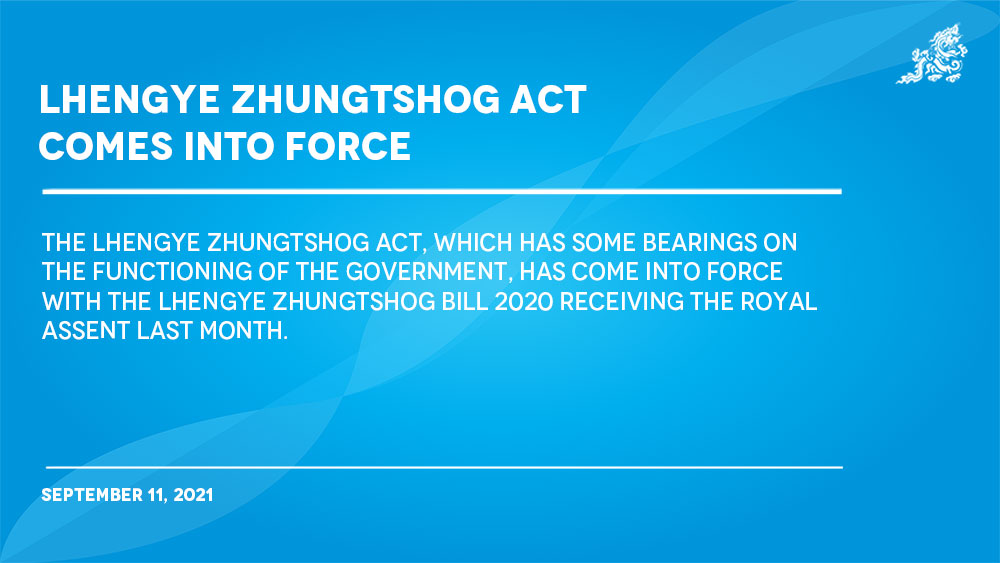MB Subba
The Lhengye Zhungtshog Act, which has some bearings on the functioning of the government, has come into force with the Lhengye Zhungtshog Bill 2020 receiving the Royal assent last month.
The new law brings the Office of Prime Minister (PMO) under the Cabinet Secretariat. The Act also brings to an end the past practice of political appointments in the PMO.
The Royal Civil Service Commission (RCSC) can now provide contract professionals to the PMO from outside of the civil service as per the Civil Service Act if they are not available within the civil service.
The National Assembly had proposed for the appointment of term-based advisors in the PMO either from within or outside of the civil service and that their entitlements and service conditions would be determined by the Prime Minister. But the Act, which was passed by the joint session, states that the remunerations, allowances and service conditions of the employees recruited under PMO would be governed by the Civil Service Act.
Prior to the enactment of the Act, the PMO appointed professionals on its own terms and conditions.
For instance, the PMO in 2019 appointed Kesang Dema, who worked with the ruling party during the 2018 parliamentary elections, as its press secretary. The PMO decided to pay Nu 75,000 to her “based on the role and her capability”.
Similarly, the first democratically elected government appointed a press secretary on contract from outside the civil service.
Foreign Minister Dr Tandi Dorji said that the government had asked for a press secretary from the RCSC but that no one came forward. The PMO appointed the current press secretary as she was found to be suitable for the job.
The foreign minister, who is also the government’s spokesperson, said that the new Act was needed as the Lhengye Zhungtshog Act of 1999 was outdated.
“Although it will not have a drastic impact, it will streamline the functioning of the government and hiring of people even if new governments come in the future,” he said.
Another change is that a vacant position of a minister shall be filled within 30 days from the date of such a vacancy. As there were no such provisions in the past, the government filled the home minister’s post four months after the official resignation of the former Home Minister, Dasho Sherub Gyeltshen.
There was no clarity in the past on whether the cabinet would continue after the dissolution of the National Assembly. The Act allows the Lhengye Zhungtshog to continue office until the formation of the interim government.
However, the Cabinet after the dissolution of the National Assembly will not have the power to take any policy decisions or enter into any agreement with foreign government or organizations.
Speaker Wangchuk Namgyel said that the Bill received Royal assent on August 26. “A Bill becomes effective from the day it received the Royal assent,” he said.
The Act allows the Prime Minister in consultation with the Cabinet to nominate officials in the regional and international offices and the Lhengye Zhungtshog shall prescribe procedures for such nominations.
Due to lack of such provisions, the appointment of former candidate of the ruling party, Tenzin Lekphel, as secretary general of Bay of Bengal Initiative for Multi-Sectoral Technical and Economic Cooperation (BIMSTEC) in September last year was questioned.
The Act prohibits the government from issuing any executive order, circular, rule or notification that is inconsistent with any provision of the existing laws.
In another new provision, the prime minister or the chairperson of the cabinet may allow ministers to participate in Cabinet session through the use of secure video conferencing technology to meet the quorum of at least two-thirds.
The Act states that every decision of the Lhengye Zhungtshog should be based on consensus and where there is no consensus, the prime minister or chairperson shall require ministers to vote by show of hands. In the event of a tie, the prime minister shall cast a deciding vote.
The draft 21st century economic roadmap and Diagnostic Trade Integration Study Update 2020 recommend establishment of an Economic Development Board (EDB) under the PMO to intervene and carry out necessary reforms in the economic and public sectors. But the Lhengye Zhungtshog Act does not have a mention for such provisions.
Edited by Tshering Palden


